Time doesn’t work; here it doesn’t make sense – an interview with Ankali
Published November, 2024
by Easterndaze
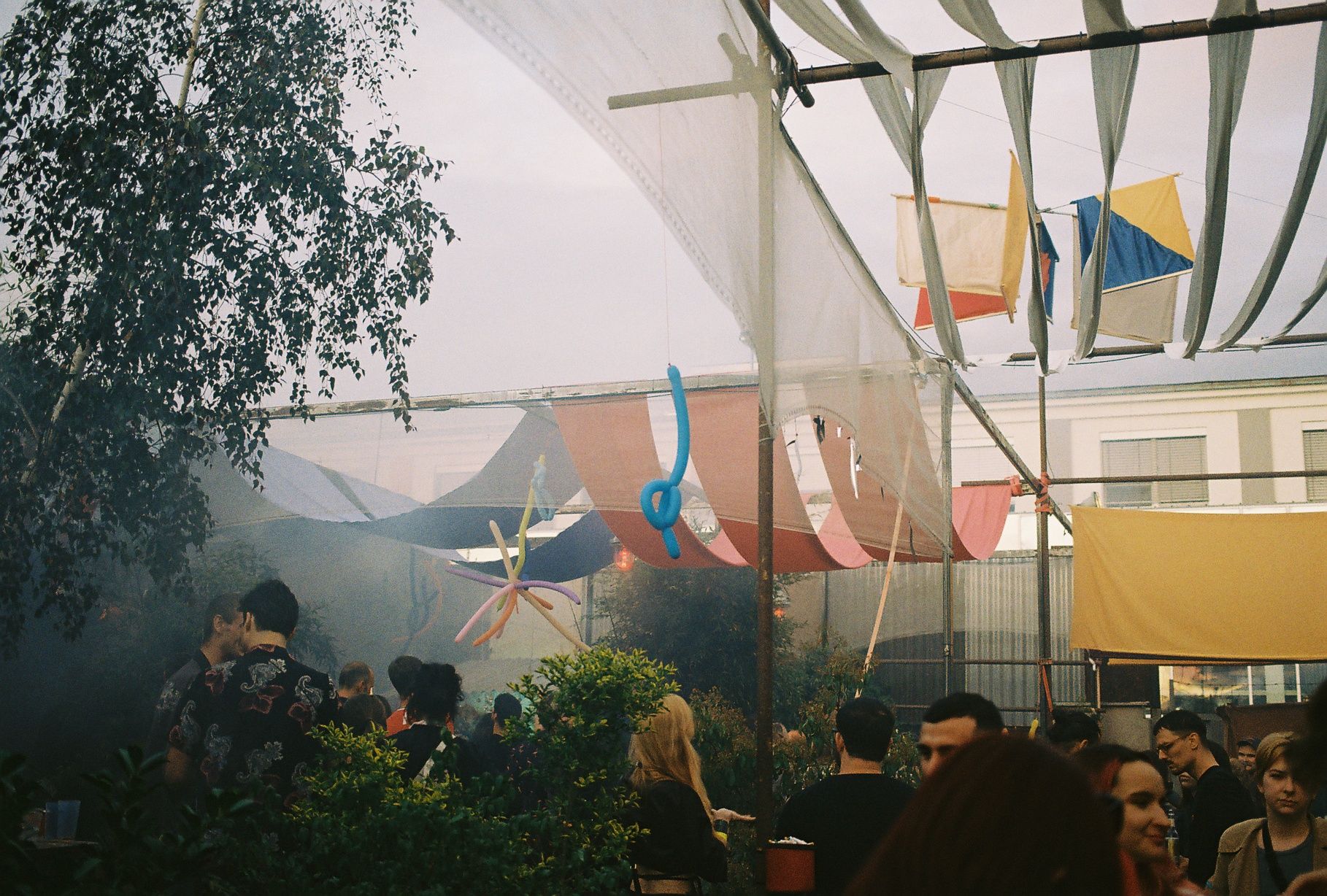
A talk with the representatives of Ankali & Planeta Za, underground gems of the Prague night life, inspired by a random visit to the venue by Bori for MMN Mag.
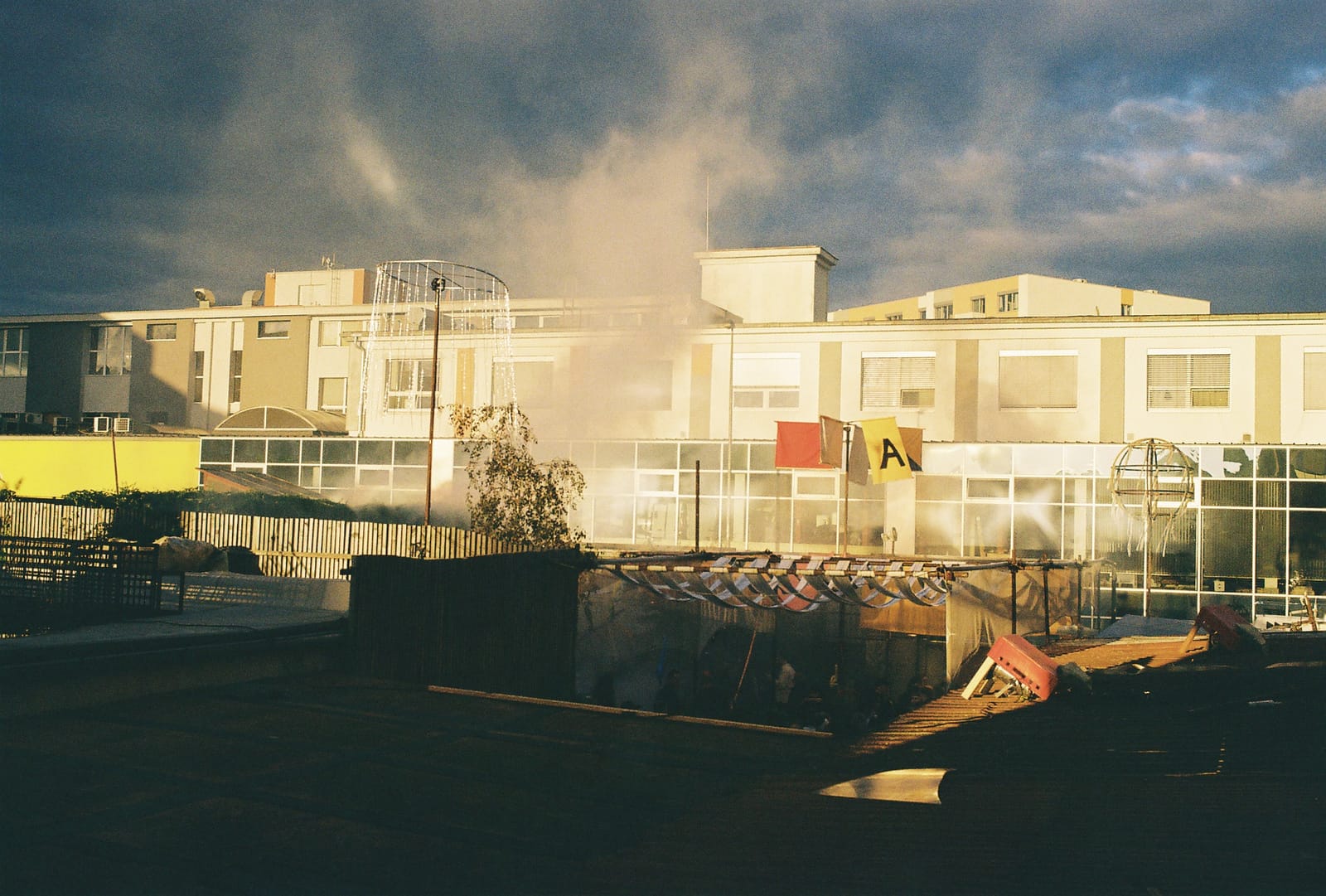
It was around 2018 when I first heard about a club in Prague called Ankali, and even though I’ve been to the city two times in the meantime, it took 6 years for me to finally step inside. On a Friday in September, with my travel companion, S., we set out on a 6-hour drive through a surprising number of pumpkin fields from Vienna to the Czech capital. We went with a completely unrelated goal of seeing Lankum play live in ARCHA+ Friday night. But as Prague has a very dear place in our hearts, we made a weekend out of it. On Saturday, after a completely devastating experience of driving to the Czech side of the Bohemian Switzerland Mountains and finding out there that the whole forest burned down two years ago, we decided to drive up to Dresden instead, where we’ve never been before – given, we were only an hour away at that point. It was then and there that I realized that that night, the garden of Planeta Za (little sister of Ankali) is having its season closing, and Rey Colino, head of Kalahari Oyster Cult is playing from 8PM. It’s quite rare that we don’t need to struggle to stay awake until 2-3AM with Club Mates in both of our hands to see such an act, so we packed up after a quick city sightseeing and drove back to Prague to arrive just in time.
At the door, we were asked whether we’ve been here before. I got a little nervous whether we’ll be cool enough to enter – I guess it’s time to print some MMN press cards? But S. has been, actually on both sides of the DJ booth, and since then he swears it’s the best sounding club he’s ever been at (and that’s saying a lot).

Ankali is situated in a former soap factory in Prague. Started as a warehouse party series, opened as a club in 2017, now a community center with 5 floors. During 2020, Planeta Za, a smaller club room was built which launched after the Covid lockdown. Throughout the summer, daytime parties are held in the open air space of Planeta Za, which we immediately encounter stepping through the garden-side entrance. Above the garden, shiny objects fabricated from all kinds of materials spin around like weather vanes. We don’t find Mr. Colino behind the DJ booth so I quickly check on social media – he couldn’t make it due to some visa issues. Yet another almost for the day, but anyways, I’m happy to finally be here.
After the garden closes, we check out the rest of the place. On the way to Planeta Za, a vintage clothes shop is open and I can see the studio window of Shella Radio. Next to them, an entrance with pairs of shoes in front – I peek into the listening space called Pluto. Colorful textiles hang from every possible place. We go through a narrow passageway which I probably wouldn’t find if there were no people to follow. We reach Ankali: it’s dark, but the lights are always playing. My travel companion and light expert starts explaining something about bulb types or whatever which I don’t understand but they indeed look very cool.
We split up so S. can experience the beautiful KV2 sound system in Ankali while I have something close to an out of body experience to the Exhausted Modern set in Planeta Za. I cannot comprehend how such music can be played anywhere at only 10 PM and have people dancing enthusiastically. Most clubs wouldn’t open for another 2 hours in Vienna, let alone dare putting on anything experimental before people had whatever they’re having for the night.
I step out to get a drink and some fresh air. I want to know more, so I start typing drafts of questions I’d propose to the people behind this place – purely theoretically at that time.
Hi! Could you please introduce yourselves?
Jonáš Verešpej: Hi, my name is Jonáš, I’m from Slovakia originally but I’ve been living in Prague for 10 years. I’ve been working in Ankali basically almost from the beginning, since 2017. I was a night manager first, then started working as a social media person, but that role kind of grew with the club itself, so now I’m more of a communications manager, I’m responsible for the PR and social media still, but I work a lot on the public funding and I’m taking care of the Gravity Network project that we’re a part of. I’m also doing photography on the side.
Nicolas Atcheson: Hi, I’m Nicolas, I’ve been working in the club for about 3 years. I also started out as a night manager and since this year I’ve been working on bookings, I also take care of the sound system, and all things related to production. Otherwise, I’m a sound designer and I work in film, I do post-production as a second job.
Ankali has been running successfully for quite some time, even though, especially with Covid, the economic situation of the past years, and general trends towards attending clubs causing more and more venues to close down. Furthermore, you don’t seem to have the need to constantly book mainstream headliners to stay afloat, you can keep Ankali an underground and exploratory space for music. What do you think is, to be a bit of cliché, your “secret of success”?
J: Well, we’re still afloat, but it’s been tough for the past few years due to a combination of factors. I guess social media sells a kind of good image so it might seem like we’re keeping it together well but it’s getting harder and harder. Back when Ankali opened in 2017 there were basically no clubs in Prague, so we had close to no competition. Two other clubs opened shortly after, one very small and the other one about the same size as Ankali, which is now, let’s say, our main competitor, but with pretty different programming. So we were in a very good position in the beginning, we became the first real alternative to the warehouse parties that were going on. I mean, Lunchmeat festival had a club before too, but it was smaller and it closed a few years before. Looking back, the first 2-3 years were kind of utopian in a sense, we didn’t have to push too much and the club was full most of the time – it was the only place to go to, basically. But then Covid came, and a lot of things changed, and I think the biggest reason we’re alive is because none of us is doing it for the money. Which might sound like a very cheesy answer, but, you know, it’s a passion project for all of us, we love it, we believe in it, and we put a lot of energy into it – which is definitely not compensated financially as well as we would like it to, but some of us have other jobs on the side. This is also how we could sustain ourselves during Covid and why we didn’t have to completely close down the club and start doing something else.
Another reason is that the public funding works quite well here compared to what I hear about other countries. We’ve been managing to get some funding from 2021 onwards on a yearly basis which is a significant help financially, even if it’s a lot of additional work.
N: I don’t know if we have the “secret ingredient” in the past year or so. (laughs) I think it comes down to material issues. People just don’t have the money to go out… Everything is getting more expensive, while our ticket prices have not been going up really. I started going to Ankali 7 years ago, back then it was constantly full, and the ticket prices weren’t so different than today.
J: I just calculated this for a public funding project, the average ticket price has been pretty constant, around 250 CZK, which is about 10€.
N: Yeah, and everyone’s talking about how, you know, there’s a younger generation that doesn’t care a lot about this kind of music, or they don’t have the kind of attention span that we’re trying to grasp. And the original community that went to these warehouse raves and later attended Ankali are, well, getting older, they already have kids and they have different priorities in life. They still come to the club for some of the main events, but not every second Saturday like they used to.
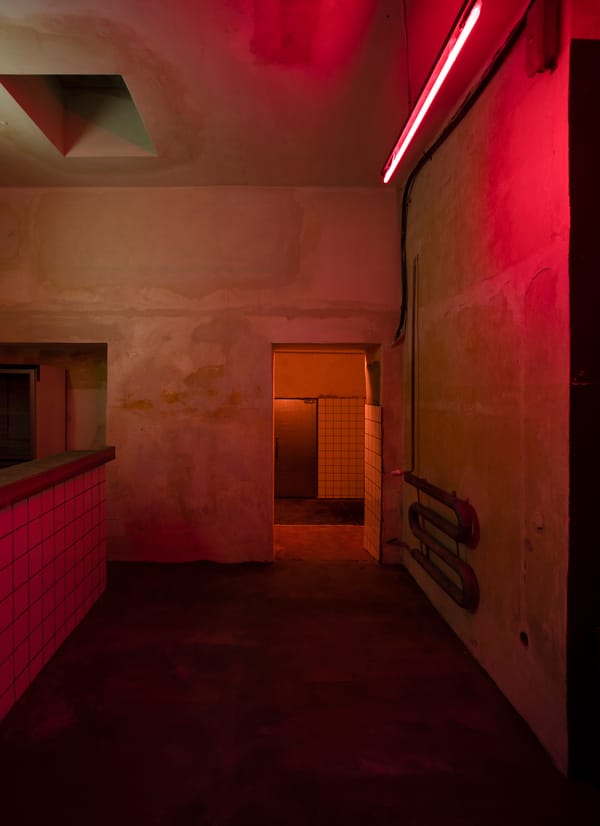
J: Maybe what’s important to note in terms of programming is that in the beginning about 50% of the program consisted of our own events and for the rest of the nights we collaborated with other collectives or we rented out the place. Nowadays, we do less and less of our own events, because the other, external events bring in other crowds, they attract different communities of specific sub-genres which we as a club and crew, however open-minded, aren’t able to reach. We have certain sounds we like, which naturally evolves with time, but it can’t be everything. So we try to open up with the programming and musical styles represented, and I think the fact that we’re open to collaboration with new people and to new kinds of approaches also contribute to keeping the club alive.
We’re expanding in other areas as well, not just genres, which maybe helps in sustaining ourselves. We’ve been growing in terms of space: back in 2017 the place was much smaller, it was only Ankali, which was just a dark club, but then during Covid we renovated the part of the place where Planeta Za (including the garden), Pluto, and Shella Radio are functioning now. Thanks to this, we could also expand the range of activities we do, we’ve been doing movie screenings and other events. We’re trying to tap into different crowds and become more of a multipurpose space. I think this definitely helps in terms of how the club is perceived, and growing out from being only a party place helps with the funding as well.
I find this interesting because I’d think the more you limit your sounds to a certain genre (let’s be honest, techno) the better you’ll do.
J: I think the genre itself is a secondary thing even though techno is obviously still strong. I think what happened here is that it actually became so extremely mainstream – to the point where we’re not even talking about a scene at all, just really big commercial events; it became too big and people just got fed up with it. We still do some techno but it’s usually not the biggest draw. Progressive house and trancey sounds became quite the hype recently which, I think is mainly thanks to Harmony records here, but yeah, I don’t think the genres play the most significant role. It’s more about the circle of people, friends of friends, and the vibe of the party.
N: It’s always good to collaborate with external organisers, because they each have a pool, their own kind of crowd that’s loyal to them. The most successful events are really a cocktail of a lot of ingredients, not only the genre, but the crowd, the overall vibe, the personality and efforts of the people who organise them.
J: What we are seeing is that it’s much harder now in general. When Ankali first opened, there was a long list of these bigger DJs who we wanted to invite and whenever we did, those parties worked out really well. When you host Ben UFO for the first time you can expect it’s going to be huge, but people don’t seem to be so interested in the big names anymore because they already saw them, I guess. So you have to really strategise when you’re building a lineup now and play around with local artists to create a good combo of an international DJ and a strong local support.
N: Local lineup has been the alpha and omega of most of the events recently. Just thinking smart on who to book to create a good energy. It also helps a lot that the local DJs are cooperative in the promotion, they think about how they can help the event to pay for itself basically.
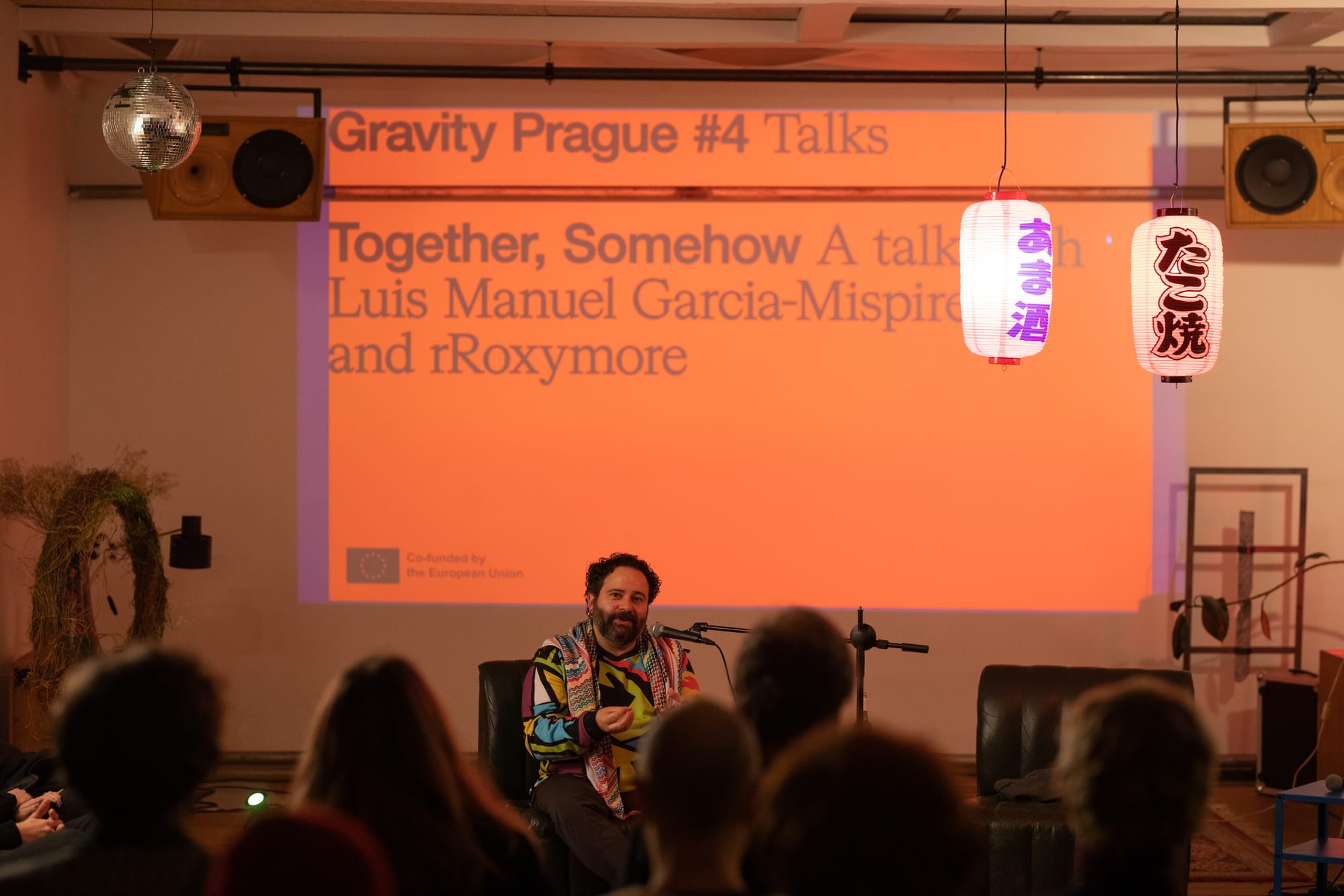
Ankali is a member of an EU funded club network you mentioned, Gravity, as well as Reset! – which, actually, MMN Mag is also part of. In what way are these networks contributing to your functioning?
J: Reset! basically just approached us, that they like what we’re doing, we fit their vibe, and proposed we should join. We’ve been members since then, but we’re not very active to be honest. We’re a very small team and unfortunately we don’t have that much capacity.
Gravity Network provides financial support, but that’s specifically for activities related to the network itself. It’s an artist mobility project, we have a roster of 10 artists and all of them play 2 times a run in all of the network’s clubs, so for example these events are more or less covered by the funds. Apart from that, there are some discourse and education activities which, for me at least, are a big plus. We get to invite some interesting guests for discussions and screenings and so on, and this also helps with networking and finding new connections across Europe. Unfortunately, we didn’t get the funding for this year, so we’re going to try again in January.
I was very excited about inviting all of these interesting people from Amsterdam and Berlin, and “gain access” to something, but lately I’ve been reevaluating this, cause I feel like we should focus more on what we have here, and I think Ankali needs to find its bearings on the local level. The original idea of Gravity was to focus on the peripheries of Eastern Europe, and we basically said “we are on the periphery and we are trying to connect with others on different peripheries”. But later on we realised that there are interesting small scenes in the west as well which could be considered as peripheral, at least in the meaning of the term as we originally understood it.
You already touched on public funding. In Hungary, a huge issue is the lack of cultural funding, or at least the willingness to use it. Without such support, only from tickets and the bar, it feels close to impossible to organize underground events that may be more risky and could have a low turnout. What’s your experience with this, and the state and city funding in general?
J: From the Ministry of Culture we get around 800k CZK which is around 30k euros yearly since 2021. These funds are very significant, and it’d be a huge problem if we didn’t get them at one point. From the Municipality of Prague we started getting support last year, which also helps a bit. The jury members who decide about giving out these grants are cool – I guess, since we got the money –, I don’t feel like there was an issue of understanding what we do as a part of culture. I was told that it’s unheard of, for example, in Italy, to get this kind of funding outside of classical music. At the same time, the situation in the Czech Republic, both politically and financially, is getting worse and the budgets are decreasing each year, so I’m not sure how long we are going to receive this support.
Did the government help you get through Covid as well?
J: There were a couple of programs which helped with a small amount of money, nothing significant. But there were some tax discounts and possibilities to delay payment duties, for example, companies didn’t have to pay the social security taxes of their employees. I, as a self-employed person, also got some bonuses. So, they definitely tried to help. Also, the parking was free for like half a year. (laughs)
How do you see the willingness of Czech people to consider electronic (dance) music as “culture”? In Germany, the “Berlin techno scene” for example is part of the country’s Unesco cultural heritage list, and Berghain became a “cultural institution”. My experience differs a lot, in Hungary not only the governmental, but the public sentiment towards electronic music is still mostly negative and judgemental.
N: I think the scene is so obscure that the public doesn’t care too much. Looking at the bigger picture and more commercial places, I’d say the Czech people are pretty liberal. Whether we should get public funding though is a completely different question. There was actually an article recently, comissioned by a guy who owns the Rock Café in the city center, which essentially just bashed Ankali, saying that our website is only in English and we get public funding for raves and stuff. (laughs)
J: Yeah, I guess because they didn’t get funding and we did. But generally, I think Czechs are pretty tolerant and open-minded to the culture in general. I wouldn’t say the same about people in Slovakia, where I’m originally from. There, electronic music largely remains to be perceived as this unintelligent, junkie thing – even my parents used to think that and they’re quite liberal generally. But here it has a very different history and connotations. The rave and freetekno scenes were quite big in the 90s and those were probably perceived as junkie stuff as well, but with the turn of the millenium the scene moved from illegal raving to legal spots and festivals which doesn’t bother people as much. I think, as long as it doesn’t bother them, Czechs don’t really care about what’s going on. Also, the police are super chill here, there are no curfews, we don’t have to have the kind of licensing as a club in Amsterdam would, we can run as long into the night as we want during the whole week and no one cares. We used to do a lot of warehouse events and when the police came they just asked us to turn the music down and left, mostly with no repercussions whatsoever. And I think money is also a driving force because eventually the authorities understand that there’s money to be made from nightlife.
I guess Ankali has quite a luck with its surroundings as you don’t have many neighbours to worry about. Obviously, it’s not in the city centre, which is yet another thing that’d be strange in Budapest. There was a time when clubs were popping up constantly in the outskirts of the city but they were only alive for a couple of months as people didn’t make the effort to get there.
N: There’s a similar situation in Bratislava from what I’ve heard, they opened a club called Subdeck that could be considered an alternative to the places that are downtown. It’s still close, just across the bridge basically, a 15 minute trip from the city centre by foot, and people are reluctant to even take this extra effort.
J: Yeah, the location for Ankali was chosen deliberately far away from the tourist center, and it worked well until places located closer to the center started popping up, and then it became a lot more convenient for people to stay in the city and go to these clubs instead.
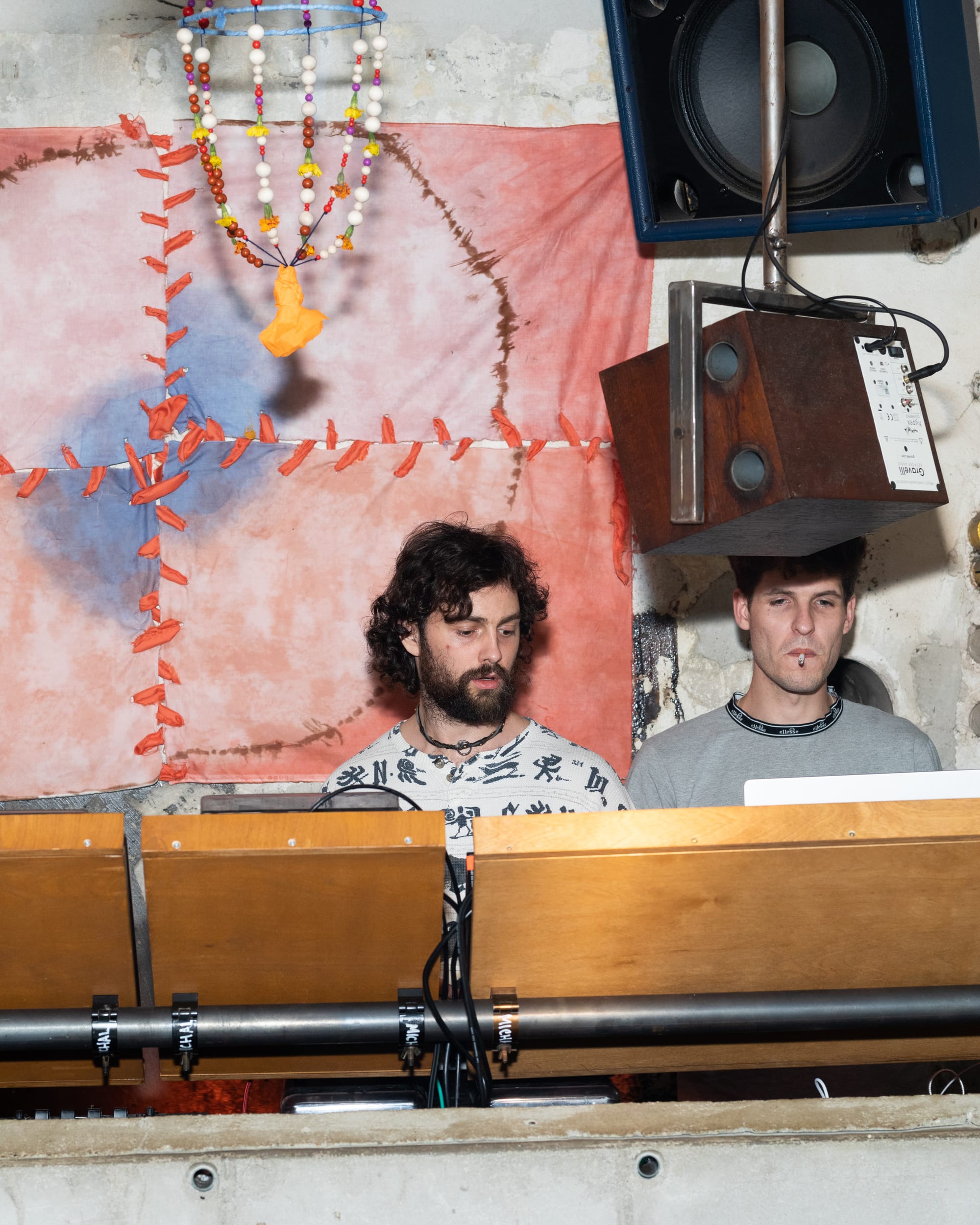
As it often feels in Budapest that it’s hard to convince audiences to go out of their way and hear new sounds, check out new series, attend anything that’s not techno or house, I’m curious what you think your audience’s attitude is towards, let’s say, non-mainstream genres?
N: There’s a kind of small core group whose taste is kind of aligned with ours, like they’ll like a nice techno event just as much as they will like a dubstep or trance night, so they’re quite flexible. But there’s a bigger group of people who will select events based on what kind of music will be playing. Then there’s definitely a group who likes more eclectic sounds and will seek out more broken stuff. What I’ve noticed recently is that hosting queer events has been really nice, or events that have some political agenda: these might be more eclectic in sound since they’re trying to cater to a wide variety of guests.
J: I saw an advertisement for a party in a club in my hometown, which is… you can imagine, 100,000 people live there, it’s not really a club. But there are these commercial parties (we used to call them discotheque because that was kind of a slur when I was younger) where usually girls would have a cheaper entry and stuff like that. And now they’re doing this hardcore, industrial, black clothes, fetish, Berlin type of techno. I find it pretty funny that everyone’s selling Berghain now. There’s now a new club in Prague called Kreuzberg. (laughs)
N: Yeah it’s complete Berlin-washing everywhere, just reducing it to its most shallow aesthetic and sound and then repackaging and selling it again. It’s weird to just keep referring to a city all the time. In Prague all of these clubs are super specific, you won’t find anything like them elsewhere (except Kreuzberg). So we’re trying to simply embrace this Eastern kind of vibe.
J: Yeah, but it doesn’t mean that Berlin wasn’t a big inspiration for us in the first place. Especially for me, I did an internship in a club in Amsterdam, and it was a huge influence on me. Now as we’re getting older, we see the real value here and we try to find more unique ways of doing things.
I’m living in Vienna now, where parties without an awareness team or similar efforts are nearly non-existent, while in Budapest it’s still quite rare. During my time in Ankali/Planeta Za, you also had extensive awareness measures in place, like a booth offering juices for the people feeling sick and the like. Was this always the case for you or is this a recent advancement?
N: We started doing it a bit later. I mean, actively, because the night managers and the whole staff have always been trained. The club always had the no photo policy for example. The doorman position started soon after the club opened so there was always a kind of face check at the door. But, you know, not in the kind of sense that if you don’t pass a certain vibe or your outfit doesn’t match then you don’t get in, just basic questions, explanation of the rules of the club like no harassment, no smoking inside and whatnot. And if you’re just polite and normal you get in, simple as that.
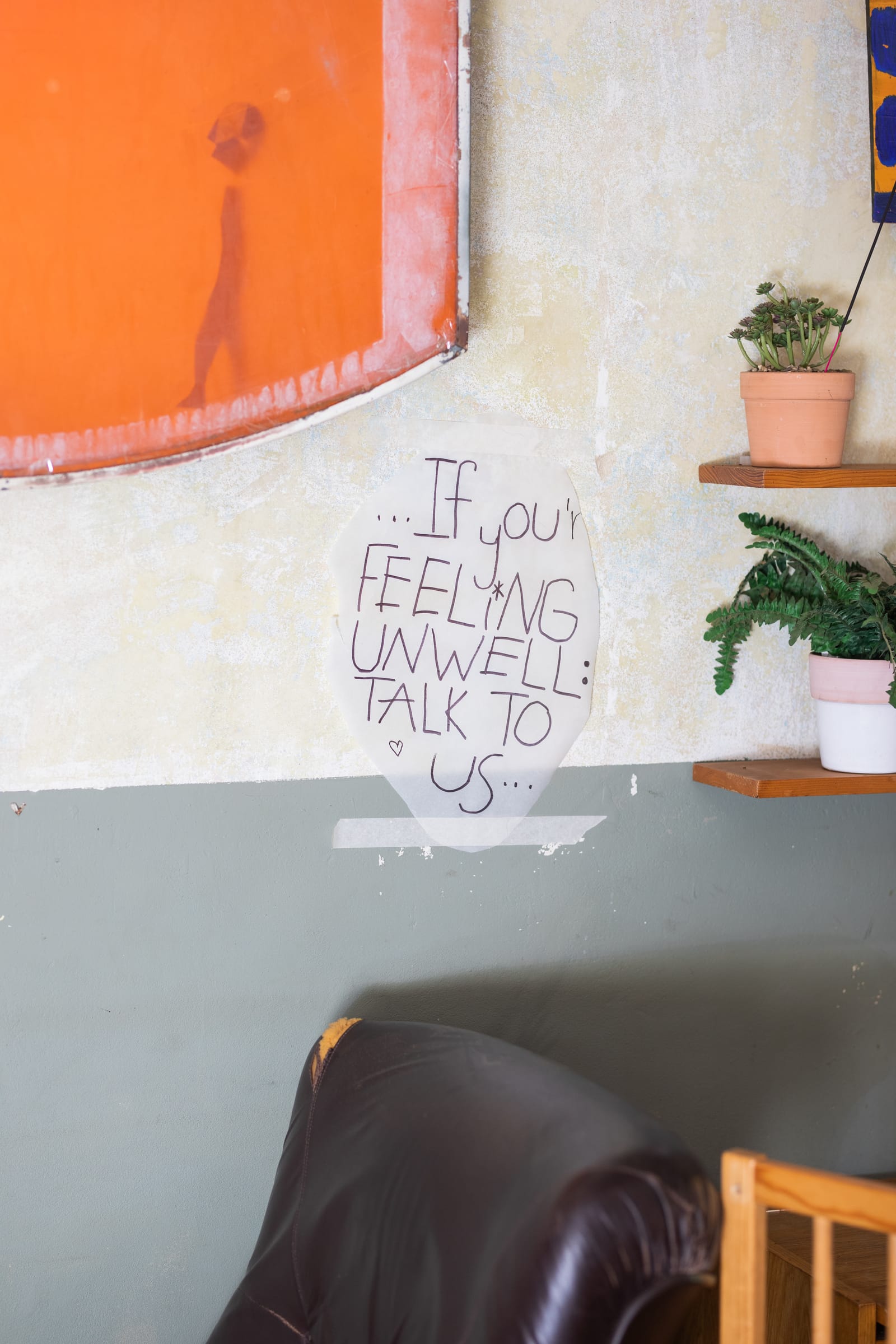
So that’s kind of the first filter, and about a year ago we implemented a second point of contact, the security search, which, for the maximum comfortability of our visitors, is not done by the classic gorilla-type security person, instead you’re searched by peeps that are around our age, usually girls. They’re supposed to be as chill as possible and bring a welcoming vibe to the whole process. We do have a no GHB/no liquids rule in the club but the securities aren’t super thorough about finding every capsule or drug or anything. The point of the search is mainly weapons and excessive amounts of drugs. Our rule is basically that you’re not allowed to do drugs in public but we won’t go around searching toilets like it’s usual in the UK, or I even heard this happening in Budapest, in clubs with zero tolerance because these places are trying to make money on alcohol.
The whole club has transformed during the past couple of years, especially with the opening of Planeta, and we’re trying to think in terms of the whole space and make it as comfortable as possible for everyone, and I hope we’re doing a good job with that. Big events like the one you were at also have awareness teams in place. When someone is a bit too high we try to help them instead of kicking them out as fast as possible.
J: What you saw, I hope, worked well, but it’s also a lot of years of trial and error. We had security guys we had to kick out because they turned out to be quite intolerant and hateful. Now the bouncers are usually only two guys and the rest are people our age who’re responsible for resolving issues via communication.
And the harm reduction team you saw, they’re all volunteers, we wouldn’t be able to afford all of them for sure. We were approached by a guy who used to come here a lot and he wanted to give back, and he said he saw this approach abroad and he wants to help people out. Even before he started doing that I saw him going around offering people mints and stuff, just being nice to people for the sake of it, you know. So, he’s organizing it with a couple of his friends now, they’re just amazing.
Sexual harassment is also an area to which clubs and promoters put more and more attention to. Do you feel you can also prevent incidents more effectively with certain awareness measures?
J: We have some structures in place that are supposed to help you in case you are encountering any kind of non-consensual situation, but there are still instances when something happens and we’re not even aware of it because people maybe don’t trust us enough or they’re afraid to approach us. It’s horrible, but there are so many reasons why someone wouldn’t want to talk about these incidents. We actually have a meeting about this tomorrow. We’re trying to rethink what other ways we can help the victims of this behavior and improve the strategy of how they can approach us during the night. I think, on the one hand, we need to improve our communication about this topic and let them know we’re here for them. On the other hand, I think collective care is the most effective tool, if people in the crowd see something and they report on that, because we don’t want to have security guys on the floor checking if someone is harassing people.
I think the situation is improving, but I also think the fight against sexual harassment and violence is a long-term battle. It’s not like we’re going to come up with a good campaign and then we’re done, it’s something we’ll probably need to rethink constantly.
Maybe it’s just my bubble, but Ankali seems to be, in a lot of aspects, the leading club in Prague. I feel like it’s most recognized by foreigners and it’s hosted probably the most international artists. With Planeta Za and Pluto opening, it became quite a large community hub, and it provides far more than any club or bar alone could for the visitors. While from an “entrepreneurial” point of view this is obviously great for you, but I’m wondering if you ever feel wary about becoming a “monopoly” which could, in theory, have a negative influence on the city’s musical ecosystem?
J: I wouldn’t say we’re a monopoly at all, in fact I think we have very strong competitors and the scene is diversified with all these other places. Ankali was the first club so maybe it’s more recognised but there’s Fuchs2 and Bike Jesus in the same building on the island, then in summer there’s Altenburg 1964, and still, there are big warehouse events going on, cause those are never the same, while in Ankali people may’ve been hundreds of times. There are also smaller, niche places like Underdog’s, or music bars like Luft. I think it’s good that we have competition because they’re pushing us to always rethink our stuff and coordinate and collaborate better.
With Bike Jesus, you recently hosted a collaborative night in Planeta Za. Obviously, all the places you’ve listed are your competitors to a certain extent, but can you also harbor relationships and facilitate creative exchange?
J: The collaboration with Bike Jesus started already last year, it’s an exchange essentially, we do an event there and then one at Ankali and we mix both of our residents. There’s also a club in Brno (the second biggest town in the Republic) called Vitamin. We’re also very close with them and hosted some events together and collaborated on lineups. It’s a good opportunity to create something new and to just party together. We did similarly sometimes with foreign clubs, for example, with Jasna 1 in Warsaw, our co-members in Gravity, and also LÄRM from Budapest (LÄRM closed its doors in 2021).
It’s kind of a cliché, but yeah, together we’re stronger. I think it’s important that you show to the crowd that you are on good terms with other promoters and clubs (if you are), otherwise it’s bad for both of you and creates a toxic situation. With Bike Jesus it was kind of stressful in the beginning, because Fuchs2 and Bike Jesus opened, younger people started going there and there was a lot of talk about who’s getting the crowds and everyone was asking about the numbers; and we said “fuck this, we’re not interested in this, yeah, we’re competitors but we want to coordinate and work together”.
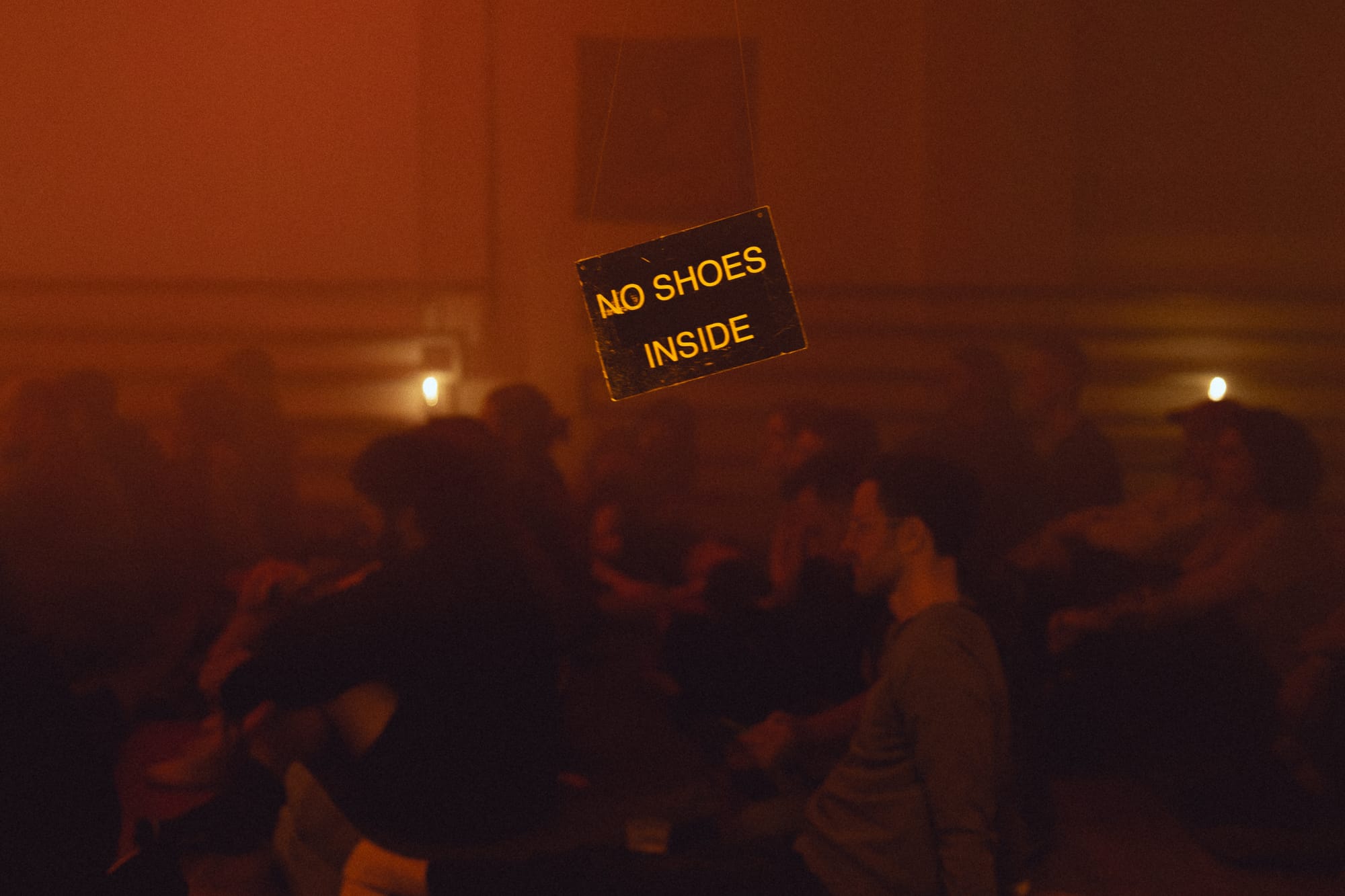
Somewhat unique to the region, the Czech Republic seems to maintain an active night life in the whole country which, again, is not the case for Hungary, where it’s central to Budapest. There are many interesting things happening, for example, as you mentioned, in Brno, as well as the festival Transforma, which has been on my radar for a while now. What makes it possible in your opinion, and what venues and events should one know of when visiting the country?
J: Transforma is an amazing festival, you should definitely go. The people who run it are also close friends of ours and we also collaborated with them for a couple of events. We were invited to host a stage last year and they did the same in Ankali. They’ve been able to do this also I think mainly due to the fact that they have different jobs and they can do this as a summertime side project, but they also started to get some funding. They’ve found the perfect spot outside of the city center of this old medieval town called Tábor. It used to be a mill I think and it was bought in the ‘90s by these American guys (Chris Rankin and Hilary Binder, members of an American punk duo called Sabot) who turned it into a very underground hardcore punk hotspot and it has been running for 30 years. Transforma built on top of this and turned it into a yearly contemporary music festival with DJs as well.
And for Brno, I think the scene is quite good because it’s a student city and there’s quite a big fluctuation of people. I was quite surprised when I was there about two years ago, there were 3 big events happening at the same night and all of them were packed. For Vitamin specifically, they’ve been having financial issues and they’ve been shut down by the authorities due to a missing license or whatever for the building, but they’ve found an investor now and they’re planning to open again in the spring fortunately.
There’s some kind of a base everywhere in smaller cities. The scene in Zlín, a city with a population of around 75.000 people, for example, couldn’t sustain a club as big as Ankali, but there are things happening there too.
N: There’s actually a good spot now in Zlín called Prostor 44 which is a super small venue in one of the old factory buildings. It’s usually rented for workshops and all kinds of cultural programs but it’s also used by local groups like Bashment soundsystem and Obscura Radio. Our friends in Liberec are doing this place called Bar papír and they’re also hosting nice events. These are venues that can’t afford foreign acts so they’re mainly good spots for local DJs to get invited to play in different cities which is super. Brno also has Fraktal, pul.pit, FÁZE…
Thank you for your time, it was a pleasure. I hope to visit you again soon in Prague.
Originally posted on MMN Mag This article is brought to you as part of the EM GUIDE project – an initiative dedicated to empowering independent music magazines and strengthen the underground music scene in Europe. Read more about the project at emgui.de.
Funded by the European Union. Views and opinions expressed are however those of the author(s) only and do not necessarily reflect those of the European Union or the European Education and Culture Executive Agency (EACEA). Neither the European Union nor EACEA can be held responsible for them.